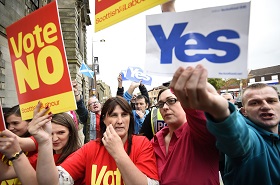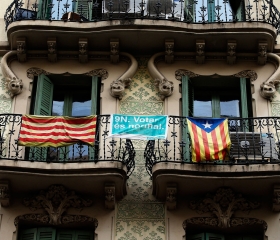Western Europe: The Autumn of Separatism
In
Login if you are already registered
(no votes) |
(0 votes) |
Doctor of History, Chief Researcher of the RAS Institute for European Studies
In terms of the quest for independence, 2014 has been a bad year for separatist movements in a number of regions in Western European countries (Scotland, Catalonia, Northern Italy, Flanders, Greenland, Corsica, Northern Ireland and the Basque Country). In some countries, the separatists lost referendums and polls, while in others the mass actions of their supporters were unsuccessful. There were signs of differences among the European Union’s regional elites. This was due to a combination of economic, social, internal and external factors, considering the tense situation in the regions adjacent to Western Europe.
In terms of the quest for independence, 2014 has been a bad year for separatist movements in a number of regions in Western European countries (Scotland, Catalonia, Northern Italy, Flanders, Greenland, Corsica, Northern Ireland and the Basque Country). In some countries, the separatists lost referendums and polls, while in others the mass actions of their supporters were unsuccessful. There were signs of differences among the European Union’s regional elites. This was due to a combination of economic, social, internal and external factors, considering the tense situation in the regions adjacent to Western Europe.
In politics, like in nature, seasons sometimes intriguingly coincide with the development of various trends. The Prague Spring in the latter half of the 1960s metaphorically reflected the hopes of much of Czechoslovakia’s population for change. The Paris “Hot May” of 1968 was a measure of the high pitch of political passions in France. The term “hot autumn” was used in many European countries to refer to the early stage of social strife. Today, the political processes in some regions in Western European countries could best be described as an autumn cool which has sobered up some hotheads who are anxious to obtain sovereignty for their regions.
The Shedding of Hopes
Another notable feature is the lull this year in the terrorist activities of radical separatists. Separatist leaders in such volatile regions as Corsica and the Basque Country have officially declared that they were committing themselves to a purely political struggle.
The Scottish separatists led by Alex Salmond lost the September 18, 2014 referendum on independence by a margin of ten per cent [1]. In Catalonia, the champions of self-determination led by the head of the regional government, Artur Mas, suffered a setback when he failed to persuade the Spanish authorities to allow an independence referendum on November 9, 2014. The Spanish Conservative Government was even against the poll, declaring it unconstitutional. As a result of the unsanctioned “consultative poll”, less than a third of Catalans eligible to vote backed independence [2]. The Spanish authorities disagreed with the opinion of the political elite of the Basque Country, which came out for the Iberian Peninsula becoming a confederation. The demands of the Flemish separatists in Belgium for a confederation were put on the back burner after a new Belgian government was formed on October 10, 2014 [3]. In the spring of 2014, the Italian government ignored the internet referendum in the northern province of Veneto, where the majority of the people supported sovereignty for that part of the country [4].
Independence supporters in other Western European regions, too, have little to show for their efforts. The Danish government resisted the bid to hand over the uranium ore deposits in Greenland – a part of the kingdom – to the people and the authorities of that territory [5]. Had talks with the mother country proved successful, the people of Greenland would have had an economic basis for its calls for independence. Another notable feature is the lull this year in the terrorist activities of radical separatists. Separatist leaders in such volatile regions as Corsica and the Basque Country have officially declared that they were committing themselves to a purely political struggle [6]. There have been no shootings or bombings in the once troubled Northern Ireland.
The Economic Element
The formula “politics is a concentrated expression of economics” is relevant to the theme of European separatism. Seeking independence without serious economic levers is a road that leads into a dead end.
The formula “politics is a concentrated expression of economics” is relevant to the theme of European separatism. Seeking independence without serious economic levers is a road that leads into a dead end. This seemed to be the main argument for the majority of Scots who voted against sovereignty in the September 18 referendum. Because Great Britain is good at resisting various forms of economic crises in the Old World, the Scots chose to have a bird in the hand rather than two in the bush. All the more so because if Scotland became independent, the central government was not going to retain the pound as the national currency or hand over much of the North Sea oil and gas revenue [7]. The Flemish separatists decided to restore the coalition with the Walloon parties after a sober assessment of post-crisis economic potential in the event of a hypothetical independence of Flanders.
The separatists in Catalonia also began to have doubts about the economic outlook if they were to be given independence. Although Catalonia accounts for some 20 per cent of Spain’s GDP, it would put its prosperity at risk if it had no say in the centralized divvying up of the budget [8]. Economic issues also worry the Catholic separatists in Ulster because Ireland, which they would like to join, is only beginning to climb out of the European Union’s debt pit. Ulster as part of Great Britain looks economically preferable to a hypothetical “new motherland”.
Internal Disarray
The slogan “Separatists of all lands, unite” does not seem to have much appeal and implementation in the new European Parliament.
The party mosaic in the regional sore spots in Europe mirrors the bundle of economic and social contradictions that characterize the majority of the above-mentioned states. Much of the business community sees no real future for the development of regional business without destroying the established pattern of links with the centre. It would be naive to hope that investments would flow to the new entities in a period of political instability. Wage earners and pensioners are not convinced that they would be securely protected against the consequences of the crisis in independent Scotland, Catalonia, the Basque Country, Flanders and Northern Italy.
In addition to differences in the ranks of regional parties and movements, the local national political forces are staunch opponents of separatism. Conservatives, Liberals and the opposition Labour set aside their differences and voted against Scottish independence. In Spain, the idea of a Catalan referendum was rejected by the conservatives in the ruling People’s Party and by the opposition socialists. The Convergence and Union Party led by Artur Mas chose not to confront them. At the same time another Catalan party, the Republican Left, called on the people of the province to stage acts of civil disobedience. The New Flemish Alliance, which advocated federalization, failed to win the support of local Christian Democrats and Liberals. These parties want greater independence for Flanders, especially on budget matters, but are not yet ready to join the New Flemish Alliance and rush confederative reform in the Belgian Kingdom.
The slogan “Separatists of all lands, unite” does not seem to have much appeal and implementation in the new European Parliament. In previous EU legislatures, regional separatists for the most part were members of a relatively big group together with the European environmentalists – the Greens/European Free Alliance. Today, only the separatist-leaning Scottish and Welsh parties are members of the Green Party in the European Parliament. The Liberal alliance within the European Parliament has been joined by the separatists from Catalonia and the Basque Country. The Belgian New Flemish Alliance ended up among the Eurosceptics from European Conservatives and Reformists group. The Northern Irish Sinn Fein has joined the United Left group. The radical separatists from the Belgian Flemish Interest and deputies from the Italian Northern League have failed to join any of the groups proclaimed in the European Parliament [9].
Manoeuvres of the Central Authorities
The illusory hopes that the new entities, having hived off from their states, would automatically become members of the corresponding supranational associations, were repeatedly dashed by the representatives of these organizations.
The problems that confronted European separatists in 2014 stem not only from objective, above all economic, circumstances. Nor are they largely the result of disarray in their own ranks and lack of a consolidated position at the European level. A lot depended on the successful tactics of the government and state structures, especially in the run-up to the referendums, when talks were held between the central and regional authorities. The most vivid examples are the Scottish referendum and the failed vote in Catalonia. In the former case the Cameron government, having agreed to a plebiscite, did everything on the propaganda front to preserve Great Britain as one. In addition to explaining to the Scots the discomforts that independence would bring, the authorities announced reforms in the financial, economic and social spheres that they would guarantee if Scotland voted to remain part of the United Kingdom [10].
As for the referendum in Catalonia, the central government, on the contrary, took a tough negative stand that was shored up by a special ruling of the Constitutional Court. However, like in the case of Scotland, Catalonia has been promised broader powers in local government and a more flexible policy on budget and tax issues. The government does not rule out possible amendments to the constitution connected with the federalization of the Spanish state proposed by the opposition socialists [11]. The new Italian government led by Matteo Renzi has also promised reforms that will, if only partly, meet the wishes of the economic and political elite in Northern Italy. The former could benefit from lower taxes on business and the latter would be guaranteed seats in the new-look Senate [12]. The opinion of the British and Spanish monarchs played a part in the tactics of the central authorities. On the eve of the Scottish referendum, Queen Elizabeth II, who until then had refrained from commenting on the upcoming event, officially declared that it was important for the United Kingdom to remain united. King Philip VI in his throne speech in June 2014 spoke in favour of the country’s unity while respecting every one of its peoples [13]. The government crisis in Belgium, which could have lasted for months, was happily resolved in October 2014 thanks to the efforts of the namesake of the new Spanish monarch, King Philip of Belgium [14].
Speaking about external influences on the negative results of the separatists in the outgoing year, we cannot fail to mention the position of the EU and NATO leaders. The illusory hopes that the new entities, having hived off from their states, would automatically become members of the corresponding supranational associations, were repeatedly dashed by the representatives of these organizations. They stressed that Scotland, Catalonia, Flanders or any other new state would have to start the EU and NATO accession procedure from scratch and on the same terms as the countries of Eastern and Central Europe over the past decades [15].
These arguments were not the least among those that made many independence supporters think hard.
The Outlook is Unclear
As of today, no single Western European state has credible candidates for self-determination. It is not just the ordinary citizens of the problem regions – Scotland, Catalonia, Flanders, the Basque Country, Corsica, Greenland and Northern Ireland – that are not prepared to launch another round of the struggle for independence; the political elite is also loathe to do so. All the above-mentioned circumstances, coupled with the situation in such explosive spots as Eastern Ukraine and the Middle East, are not conducive to the search for alternative paths to independence with an unclear perspective. At the same time, the separatists may achieve, and are already achieving, certain concessions from the centre in the economic, financial and social spheres. They are strengthening their cultural and linguistic identities, forcing the central authorities to develop the local government system. The separatists are likely to gain other important preferences for their regions in the foreseeable future. The authorities in turn may use the whip and carrot policy to localize the centripetal trends in their states.
Endnotes:
1. Vestnik Evropy ITAR-TASS, 2014, September 19, 2014, p. 2 (in Russian).
2. Vestnik Evropy ITAR-TASS, November 11, 2014, p. 5 (in Russian).
3. Schweitzer, V. The Brussels Conundrum. Vestnik RIAC. October 24, 2014 (in Russian).
4. Kompas, ITAR-TASS, 2014, No. 17, pp. 2–3 (in Russian).
5. Ibid., 2014, No. 6, pp. 4–9 (in Russian).
6. Vestnik Evropy, op.cit. June 28, 2014, p. 5 (in Russian).
7. Kompas, op.cit. 2014, No. 39, pp. 31–34 (in Russian).
8. Kompas, op.cit. 2014, No. 41, p. 10 (in Russian).
9. Schweitzer, V. Elections to the European Parliament: Shifts in the Party-Political Space, in: Sovremennaya Yevropa 2014, No. 4, p. 24 (in Russian).
10. Kompas, op.cit. 2014, No. 42, p. 4 (in Russian).
11. Vestnik Evropy, op.cit. October 23, 2014, p. 6; op.cit. November 13, 2014, p. 2 (in Russian).
12. Vestnik Evropy, op.cit. April 1, 2014, p. 8(in Russian).
13. Vestnik Evropy, op.cit. June 20, 2014, p. 7 (in Russian).
14. See footnote No. 3(in Russian).
15. Schweitzer, V. Separatists in Europe: Strangers at Home. Vestnik RIAC, March 12, 2013 (in Russian). 2014, Moscow, Schweitzer, Vladimir Yakovlevich
(no votes) |
(0 votes) |







